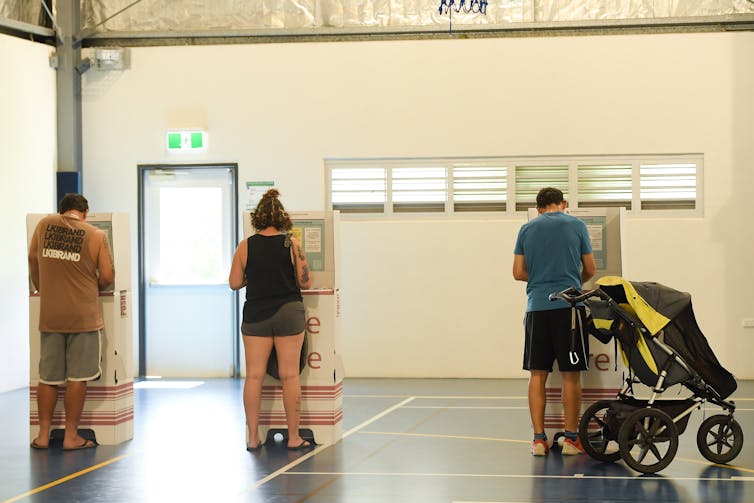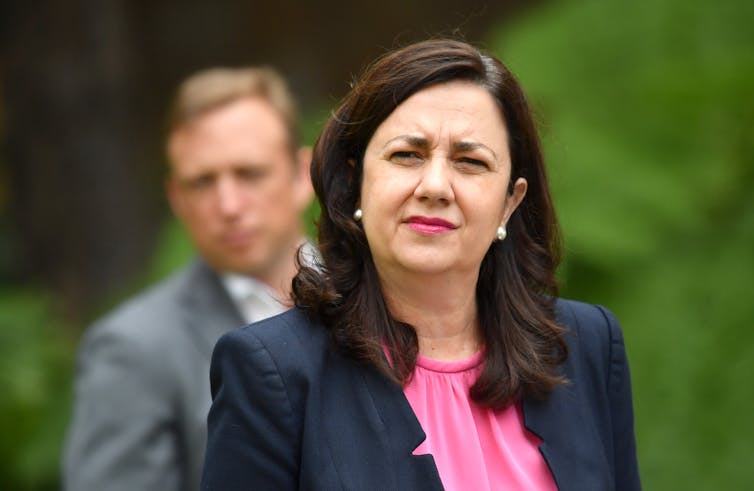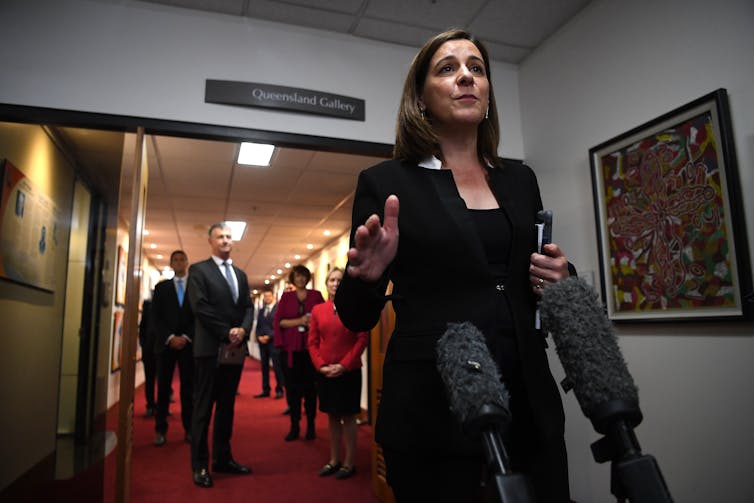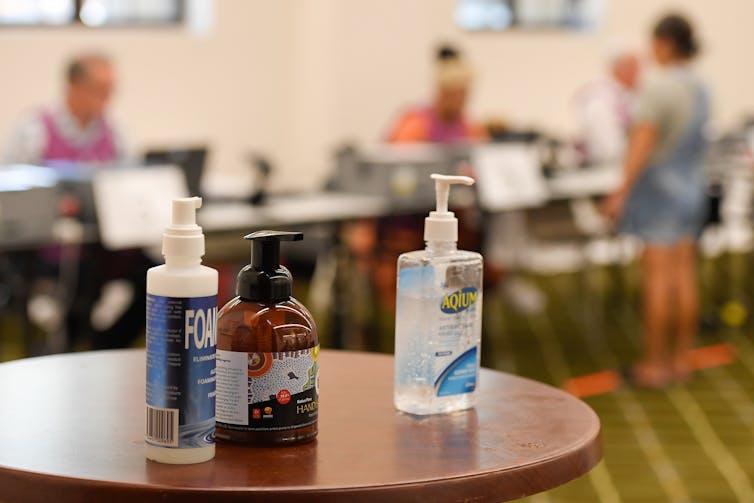Queensland's unpredictable election begins. Expect a close campaign focused on 3 questions
- Written by Paul Williams, Senior Lecturer, School of Humanities, Griffith University
The Queensland election campaign officially begins this week, with the government entering caretaker mode on Tuesday, and the election set for October 31.
But the crystal ball for this election, which will see a number of significant firsts, is frustratingly cloudy.
Palaszczuk vs Frecklington
This is the state’s first election for a four-year fixed term of parliament since 1893. It’s also the first occasion at which the leaders of the two major parties — Labor’s Annastacia Palaszczuk and the Liberal-National Party’s (LNP) Deb Frecklington — are women.
 Queenslanders will be voting in a government for four years.
Albert Perez/AAP
Queenslanders will be voting in a government for four years.
Albert Perez/AAP
Meanwhile, apart from August’s Northern Territory election, Queensland’s poll will be the first major electoral test of any Australian jurisdiction since the beginning of the COVID-19 pandemic.
All of this makes the election extremely difficult to forecast, especially given the marked difference in how voters rate the parties, as opposed to their leaders.
That’s before you throw in the pull of four significant minor parties and their unpredictable preference flows.
A change of government is possible
Even so, we might say Labor is Queensland’s “natural” party of government, given it has held office for 26 of the past 31 years, and for 70 of the past 105 years (since the birth of the modern party system).
This stands in sharp contrast to Queenslanders’ predilection to back conservative parties at federal elections. In 2019, for example, the state swung toward the Morrison-led Coalition at a rate about four times the Australian average.
Read more: Queensland to all those #Quexiteers: don't judge, try to understand us
Heading into the election, Labor holds a razor-thin buffer, with just 48 seats in the 93-seat parliament. A tiny after-preference swing of 0.7% would see Labor lose two seats and its majority.
The LNP, currently on 38 seats, must win nine additional seats, via a 3.4% swing to form majority government.
Ironically, that’s virtually identical to the 3.5% swing against the NT Labor government last month.
In June, a YouGov poll had the LNP in front of Labor, 52% to 48%, two-party preferred. In July, Newspoll had the LNP ahead, 51% to 49%.
The implications are clear: victory for the LNP is eminently possible.
A hung parliament is also on the cards
With polls putting Labor’s primary vote as low as 32%, preferences will be crucial and minor parties will once again play a significant role.
Because of recently introduced election spending caps, Clive Palmer’s United Australia Party is expected to walk away empty-handed. This comes after Palmer donated almost $84 million to his own campaign during the 2019 federal election.
But with Pauline Hanson’s One Nation likely to maintain its lone seat, Katter’s Australian Party its three, and the Greens almost certain to double their representation to two, a hung parliament – a repeat of the 2015-17 term – is also a real possibility.
Referendum on three questions
For these reasons and more, the political eyes of Australia will be on Queensland on October 31. And it will invariably be a referendum on three questions.
 Annastacia Palaszczuk has been premier since 2015.
Darren England/AAP
Annastacia Palaszczuk has been premier since 2015.
Darren England/AAP
The first is whom Queenslanders trust more as their premier for the next four years.
In late July, Newspoll found 81% of those surveyed approved of Palaszczuk’s handling of the pandemic, with 57% preferring her as premier. Just 26% preferred Frecklington.
 Deb Frecklington took over as opposition leader in December 2017.
Dan Peled/AAP
Deb Frecklington took over as opposition leader in December 2017.
Dan Peled/AAP
But a late September, Newspoll saw a marked dip in Palaszczuk’s ratings, with 69% of respondents saying the premier was performing well over coronavirus.
Health vs economy
A second question is which public policy frame — public health or economic buoyancy — do Queenslanders rate more highly? This comes down to simple arithmetic.
Read more: Did someone say 'election'?: how politics met pandemic to create 'fortress Queensland'
If those angry at hard border closures and damaged hospitality, tourism and other small businesses outweigh those grateful for a government that has overseen just 1,160 coronavirus cases and six deaths, then Palaszczuk has a problem.
But with border and pub relaxations introduced last week, even that anger might be quelled by election day.
COVID recovery
If not, these concerns would be compounded by a third question: which party do Queenslanders trust more to navigate the state out of the COVID-19 economic quagmire?
 Queensland will be voting in the middle of a pandemic.
Albert Perez/AAP
Queensland will be voting in the middle of a pandemic.
Albert Perez/AAP
Labor has reason to feel secure here, despite state debt nearing $100 billion and an unemployment rate above the national average. In June, a YouGov poll found Labor enjoyed an 11 point lead on the question of preferred economic managers. That figure alone has panicked LNP strategists.
But since then, the LNP has come out with economic guns blazing. It has re-embraced the 1930s Bradfield Scheme — a largely debunked populist dream to divert northern rivers westward. More pragmatically, the LNP also launched a $33 billion plan to upgrade the entire Bruce Highway from Gympie to Cairns.
Given more than half the state’s seats are outside Greater Brisbane, this policy pays the sort of regional homage that wins elections in Queensland.
The Prime Minister will be watching
Beyond Queensland, who will be watching the Queensland poll most closely?
Morrison found his way back to government last year via regional Queensland, which is now torn between border closures and economic survival. He will certainly be keeping a close eye on the contest, even if it is impossible to visit in person.
There are just four weeks to go.
Authors: Paul Williams, Senior Lecturer, School of Humanities, Griffith University





